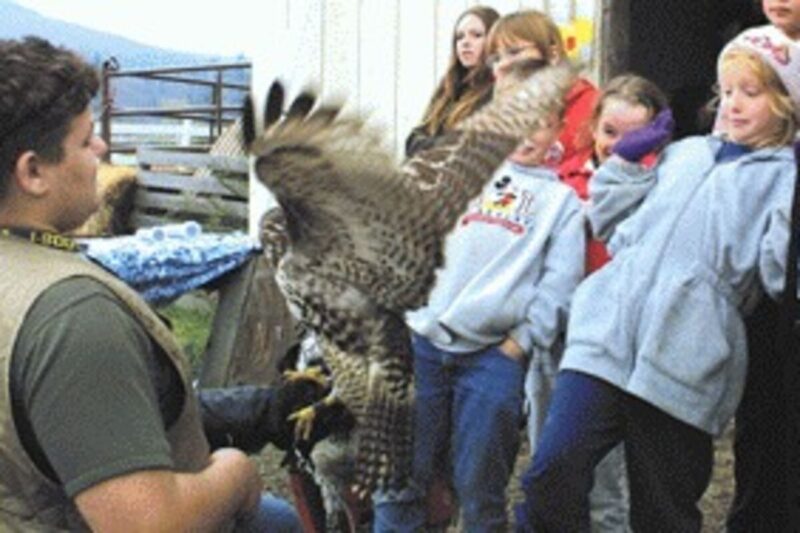Alex Paul
When Joe Reeder talks about the ancient sport of falconry, his eyes grow wide and speech increases to a rapid rate.
The 17-year-old senior at Sweet Home High School, has found his calling and it’s evident.
Self-taught and working with a sponsor, Reeder has wanted to become a falconer since the age of 12.
“I think many kids get interested in falconry after reading ‘My Side of the Mountain’ about a young boy who moves to an old farm,” Reeder said.
Reeder said his sponsor, Mike Pickett, has been very helpful. Reeder has earned his apprentice level license from the Oregon Department of Fish and Wildlife.
“I had to pass a 100 question test,” Reeder said, taking a break from showing off his prized red-tailed hawk to local school students on a field trip to Chafin Farm.
The birds are actually caught, Reeder said. His hawk was caught five weeks ago near Lebanon.
“I’ve trained him to not bite or grab with his claws,” Reeder said, although he was bitten and scratched during the training period.
“His feet are actually the worst,” Reeder said. “Hawks exert so much pressure through their feet to kill their prey. Falcons have a notch in their beak and they break their prey’s neck.”
The birds eat rabbits, mice and quail as well as small ducks and geese.
Falcons will grow to 24 inches tall, Reeder said, with wing spans of three feet.
“They move from the Arctic areas of Canada following their prey, voles, late in October into Oregon and Washington,” Reeder said.
Reeder will spend two years as an apprentice, five years as a general falconer and seven years to become a master falconer.
When he reaches the upper levels of the sport, he will be allowed to own three falcons at the same time.
Reeder makes many of his supplies such as leather harnesses.
“I keep him leashed right now and I’m teaching him to jump to my fist,” Reeder said. “As he becomes more comfortable, I’ll put him on a longer leash.”
Reeder said falcons and hawks don’t have many health issues and that being in captivity can actually increase their expected life span.
“For some birds, mortality in the wild is more than 70 percent,” Reeder said. “In captivity, they might live more than seven years.”
Reeder calls the sport of falconry a “partnership” between human and bird.
“He knows he can depend on a food every day if he works with me and when he becomes a hunter, he will get food for me,” Reeder explained.
At SHHS, Reeder has been active in wood shop projects and theater arts productions.
He plans to attend LBCC and then OSU to become a veterinarian specializing in raptors.
He is the grandson of Rose Nixon of Sweet Home.





